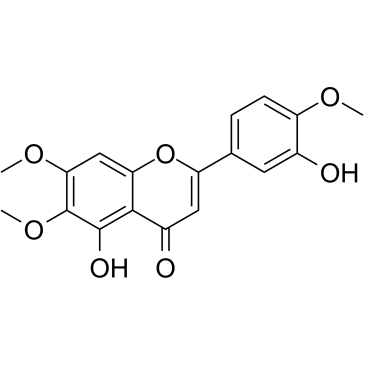
Eupatorin
CAS No. 855-96-9
Eupatorin( —— )
Catalog No. M19182 CAS No. 855-96-9
Eupatorin has antiproliferative and antiangiogenic effects. Eupatorin has antiproliferative and cytostatic effects on MDA-MB-468 human breast cancer cells due to CYP1-mediated metabolism.
Purity : >98% (HPLC)
 COA
COA
 Datasheet
Datasheet
 HNMR
HNMR
 HPLC
HPLC
 MSDS
MSDS
 Handing Instructions
Handing Instructions
| Size | Price / USD | Stock | Quantity |
| 5MG | 232 | In Stock |


|
| 10MG | 395 | In Stock |


|
| 25MG | 686 | In Stock |


|
| 100MG | Get Quote | In Stock |


|
| 200MG | Get Quote | In Stock |


|
| 500MG | Get Quote | In Stock |


|
| 1G | Get Quote | In Stock |


|
Biological Information
-
Product NameEupatorin
-
NoteResearch use only, not for human use.
-
Brief DescriptionEupatorin has antiproliferative and antiangiogenic effects. Eupatorin has antiproliferative and cytostatic effects on MDA-MB-468 human breast cancer cells due to CYP1-mediated metabolism.
-
DescriptionEupatorin has antiproliferative and antiangiogenic effects. Eupatorin has antiproliferative and cytostatic effects on MDA-MB-468 human breast cancer cells due to CYP1-mediated metabolism. Eupatorin-induced cell death is mediated by both the extrinsic and the intrinsic apoptotic pathways and through a mechanism dependent on reactive oxygen species generation. Eupatorin also has meaningful anti-inflammatory property.
-
In Vitro——
-
In Vivo——
-
Synonyms——
-
PathwayOthers
-
TargetOther Targets
-
RecptorCYP1| others
-
Research AreaCancer|Inflammation/Immunology
-
Indication——
Chemical Information
-
CAS Number855-96-9
-
Formula Weight344.32
-
Molecular FormulaC18H16O7
-
Purity>98% (HPLC)
-
SolubilityIn Vitro:?DMSO : 250 mg/mL (726.07 mM)
-
SMILESCOc1ccc(cc1O)-c1cc(=O)c2c(O)c(OC)c(OC)cc2o1
-
Chemical Name——
Shipping & Storage Information
-
Storage(-20℃)
-
ShippingWith Ice Pack
-
Stability≥ 2 years
Reference
1. Dole?ková I, et al. Fitoterapia, 2012, 83(6):1000-1007.
molnova catalog



related products
-
1,2-Dioleoyl-sn-glyc...
1,2-Dioleoyl-sn-glycero-3-phospho-L-serine sodium can be used in lipid mixtures with DOPC and DOPE as effective nontoxic and nonviral DNA vectors.
-
Azide-PEG12-Tos
Azide-PEG12-Tos is a PEG-based PROTAC linker that can be used in the synthesis of PROTACs.
-
[Arg8]-Vasotocin
[Arg8]-Vasotocin is a hormone present in the neurohypophysis of nonmammalian vertebrates that is related to vasopressin and oxytocin.



 Cart
Cart
 sales@molnova.com
sales@molnova.com


